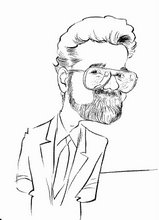Quotations & Competitive Intelligence
I've been reading Seena Sharp's new book "Competitive Intelligence Advantage"
The book is good (at least so far) - and an easy read which is more than can be said for a lot of business books. More importantly Seena's approach corresponds with mine. She emphasises that competitive intelligence is not just about competitors but about understanding the total business environment and how it is changing, and using this knowhow to make effective business decisions. This means it's not just a how-to-do-it book like many of its competitors but a why-to-do-it book too. This is important. Many businesses still fail to understand why they need competitive intelligence. If you don't understand the need, why do it. Others see the focus as primarily on competitors - but they already "know" all about them so are "OK" (or so they believe). The book exposes this canard - and shows why surprise is so dangerous for companies.
Although so far, I have mostly praise for the book, there is one niggle. Making decisions on inaccurate intelligence is dangerous. It is always important to check facts first rather than to assume that just because something is common knowledge or sounds right it is correct. In the world generally, there have been many mistakes made based on information that turned out to be rumour or false. Part of the role of analysis is to verify information - and act accordingly. Failure to verify information is a route to strategy failure.
So what is my niggle. It relates to a quotation on page 20: "It is not the strongest of the species that survive, nor the most intelligent, but the one most responsive to change." This is a great quotation - and it is widely used. A search on the Internet turns up multiple examples - and most claim it was written by Charles Darwin, in his works looking at evolution. The problem is that Darwin almost certainly never said or wrote this. A few years ago, I wanted to use this quotation in an article I was writing - and needed to provide a reference. I searched through Darwin's complete works online and couldn't find it. I then contacted Nigel Rees, an expert on quotations who couldn't either. Replies to a post I made to the FreePint Bar suggested that the attribution was probably false (but nobody knew where it originally came from). The series of posts at FreePint both by me, and others, debunk a few more commonly attributed quotations too. (E.g. "Lies, Damned Lies and Statistics" was definitely not originally said by Mark Twain as many claim and possibly not by Disraeli either, as I and others had thought.
Whenever I use a quotation I try and attribute it - and give a reference for the source, where possible. Maybe it's because I'm pedantic or overly thorough. However I also believe it is part of the mindset needed for effective competitive intelligence. Just because something is commonly believed doesn't make it true and I wish Seena had either stated that the quotation was "attributed" to Darwin instead of being by Darwin - or found the source.
In fact, the source was probably a close follower of Darwin - such as JBS Haldane. And Haldane supplies a lesson for all involved in competitive intelligence: just because something is unexpected doesn't mean it won't happen.
A discussion between Haldane and a friend began to take a predictable turn. The friend said with a sigh, 'It's no use going on. I know what you will say next, and I know what you will do next.' The distinguished scientist promptly sat down on the floor, turned two back somersaults, and returned to his seat. 'There,' he said with a smile. 'That's to prove that you're not always right. Found at Today In Science History's page on Haldane - quoting from: Clifton Fadiman (ed.), André Bernard (ed.), Bartlett's Book of Anecdotes (2000), 253.





